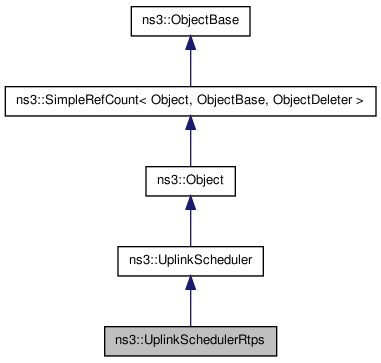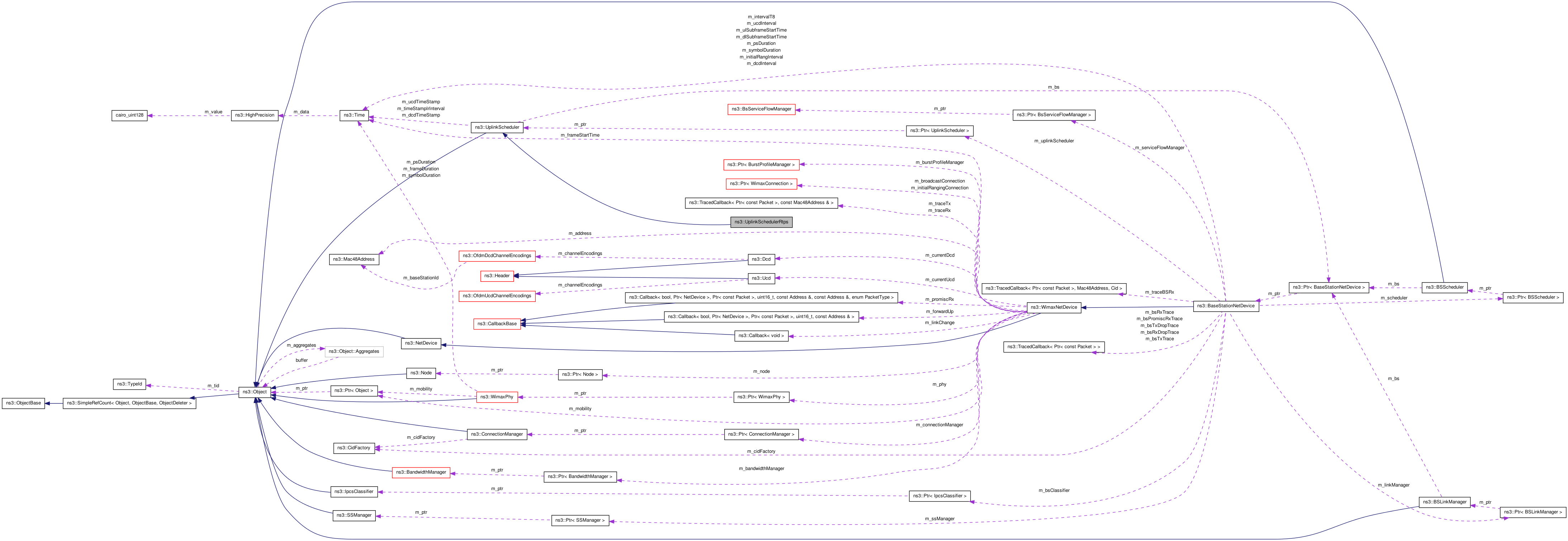This class implements a simple uplink scheduler for rtPS flows. More...
#include <bs-uplink-scheduler-rtps.h>


Public Member Functions | |
| UplinkSchedulerRtps (Ptr< BaseStationNetDevice > bs) | |
| std::list< OfdmUlMapIe > | GetUplinkAllocations (void) const |
| void | GetChannelDescriptorsToUpdate (bool &, bool &, bool &, bool &) |
| uint32_t | CalculateAllocationStartTime (void) |
| void | AddUplinkAllocation (OfdmUlMapIe &ulMapIe, const uint32_t &allocationSize, uint32_t &symbolsToAllocation, uint32_t &availableSymbols) |
| void | Schedule (void) |
| Schedule function. | |
| void | ServiceUnsolicitedGrants (const SSRecord *ssRecord, enum ServiceFlow::SchedulingType schedulingType, OfdmUlMapIe &ulMapIe, const WimaxPhy::ModulationType modulationType, uint32_t &symbolsToAllocation, uint32_t &availableSymbols) |
| void | ServiceBandwidthRequests (const SSRecord *ssRecord, enum ServiceFlow::SchedulingType schedulingType, OfdmUlMapIe &ulMapIe, const WimaxPhy::ModulationType modulationType, uint32_t &symbolsToAllocation, uint32_t &availableSymbols) |
| bool | ServiceBandwidthRequests (ServiceFlow *serviceFlow, enum ServiceFlow::SchedulingType schedulingType, OfdmUlMapIe &ulMapIe, const WimaxPhy::ModulationType modulationType, uint32_t &symbolsToAllocation, uint32_t &availableSymbols) |
| void | ULSchedulerRTPSConnection (uint32_t &symbolsToAllocation, uint32_t &availableSymbols) |
| Uplink Scheduler for rtPS connections. | |
| void | AllocateInitialRangingInterval (uint32_t &symbolsToAllocation, uint32_t &availableSymbols) |
| void | SetupServiceFlow (SSRecord *ssRecord, ServiceFlow *serviceFlow) |
| void | ProcessBandwidthRequest (const BandwidthRequestHeader &bwRequestHdr) |
| void | InitOnce (void) |
| void | OnSetRequestedBandwidth (ServiceFlowRecord *sfr) |
Static Public Member Functions | |
| static TypeId | GetTypeId (void) |
| This method returns the TypeId associated to ns3::UplinkSchedulerRtps. | |
Detailed Description
This class implements a simple uplink scheduler for rtPS flows.
The UL-rtPS-Scheduler work in this way: At the beginning of the UL sub-frame some symbols are allocated to the rangingInterval Messages, DSA Messages, UGS grants and UGS/rtPS/nrtPS/BE poll. Then, the remaining available symbols are allocated to the all rtPS flows according to their requestedBandwidth. The bandwidth saturation control has been implemented to redistribute the resource if the sum of requestedBandwidth exceed the available bandwidth. At the end, if there are some free symbols, their are allocated to nrtPS and BE Connections.
Member Function Documentation
| void ns3::UplinkSchedulerRtps::GetChannelDescriptorsToUpdate | ( | bool & | , | |
| bool & | , | |||
| bool & | , | |||
| bool & | ||||
| ) | [virtual] |
Determines if channel descriptors sent in the current frame are required to be updated
Implements ns3::UplinkScheduler.
| static TypeId ns3::UplinkSchedulerRtps::GetTypeId | ( | void | ) | [static] |
This method returns the TypeId associated to ns3::UplinkSchedulerRtps.
This object is accessible through the following paths with Config::Set and Config::Connect:
- /NodeList/[i]/DeviceList/[i]/$ns3::AlohaNoackNetDevice/Phy/$ns3::BaseStationNetDevice/UplinkScheduler/$ns3::UplinkSchedulerRtps
- /NodeList/[i]/DeviceList/[i]/$ns3::AlohaNoackNetDevice/Phy/$ns3::UplinkScheduler/$ns3::UplinkSchedulerRtps
- /NodeList/[i]/DeviceList/[i]/$ns3::AlohaNoackNetDevice/Phy/$ns3::UplinkSchedulerRtps
- /NodeList/[i]/DeviceList/[i]/$ns3::AlohaNoackNetDevice/Phy/$ns3::WimaxNetDevice/$ns3::BaseStationNetDevice/UplinkScheduler/$ns3::UplinkSchedulerRtps
- /NodeList/[i]/DeviceList/[i]/$ns3::BaseStationNetDevice/BsIpcsPacketClassifier/$ns3::UplinkScheduler/$ns3::UplinkSchedulerRtps
- /NodeList/[i]/DeviceList/[i]/$ns3::BaseStationNetDevice/BsIpcsPacketClassifier/$ns3::UplinkSchedulerRtps
- /NodeList/[i]/DeviceList/[i]/$ns3::BaseStationNetDevice/LinkManager/$ns3::UplinkScheduler/$ns3::UplinkSchedulerRtps
- /NodeList/[i]/DeviceList/[i]/$ns3::BaseStationNetDevice/LinkManager/$ns3::UplinkSchedulerRtps
- /NodeList/[i]/DeviceList/[i]/$ns3::BaseStationNetDevice/SSManager/$ns3::UplinkScheduler/$ns3::UplinkSchedulerRtps
- /NodeList/[i]/DeviceList/[i]/$ns3::BaseStationNetDevice/SSManager/$ns3::UplinkSchedulerRtps
- /NodeList/[i]/DeviceList/[i]/$ns3::BaseStationNetDevice/ServiceFlowManager/$ns3::UplinkScheduler/$ns3::UplinkSchedulerRtps
- /NodeList/[i]/DeviceList/[i]/$ns3::BaseStationNetDevice/ServiceFlowManager/$ns3::UplinkSchedulerRtps
- /NodeList/[i]/DeviceList/[i]/$ns3::BaseStationNetDevice/UplinkScheduler/$ns3::UplinkSchedulerRtps
- /NodeList/[i]/DeviceList/[i]/$ns3::NonCommunicatingNetDevice/Phy/$ns3::BaseStationNetDevice/UplinkScheduler/$ns3::UplinkSchedulerRtps
- /NodeList/[i]/DeviceList/[i]/$ns3::NonCommunicatingNetDevice/Phy/$ns3::UplinkScheduler/$ns3::UplinkSchedulerRtps
- /NodeList/[i]/DeviceList/[i]/$ns3::NonCommunicatingNetDevice/Phy/$ns3::UplinkSchedulerRtps
- /NodeList/[i]/DeviceList/[i]/$ns3::NonCommunicatingNetDevice/Phy/$ns3::WimaxNetDevice/$ns3::BaseStationNetDevice/UplinkScheduler/$ns3::UplinkSchedulerRtps
- /NodeList/[i]/DeviceList/[i]/$ns3::SubscriberStationNetDevice/Classifier/$ns3::BaseStationNetDevice/UplinkScheduler/$ns3::UplinkSchedulerRtps
- /NodeList/[i]/DeviceList/[i]/$ns3::SubscriberStationNetDevice/Classifier/$ns3::UplinkScheduler/$ns3::UplinkSchedulerRtps
- /NodeList/[i]/DeviceList/[i]/$ns3::SubscriberStationNetDevice/Classifier/$ns3::UplinkSchedulerRtps
- /NodeList/[i]/DeviceList/[i]/$ns3::SubscriberStationNetDevice/Classifier/$ns3::WimaxNetDevice/$ns3::BaseStationNetDevice/UplinkScheduler/$ns3::UplinkSchedulerRtps
- /NodeList/[i]/DeviceList/[i]/$ns3::SubscriberStationNetDevice/LinkManager/$ns3::BaseStationNetDevice/UplinkScheduler/$ns3::UplinkSchedulerRtps
- /NodeList/[i]/DeviceList/[i]/$ns3::SubscriberStationNetDevice/LinkManager/$ns3::UplinkScheduler/$ns3::UplinkSchedulerRtps
- /NodeList/[i]/DeviceList/[i]/$ns3::SubscriberStationNetDevice/LinkManager/$ns3::UplinkSchedulerRtps
- /NodeList/[i]/DeviceList/[i]/$ns3::SubscriberStationNetDevice/LinkManager/$ns3::WimaxNetDevice/$ns3::BaseStationNetDevice/UplinkScheduler/$ns3::UplinkSchedulerRtps
- /NodeList/[i]/DeviceList/[i]/$ns3::SubscriberStationNetDevice/SSScheduler/$ns3::BaseStationNetDevice/UplinkScheduler/$ns3::UplinkSchedulerRtps
- /NodeList/[i]/DeviceList/[i]/$ns3::SubscriberStationNetDevice/SSScheduler/$ns3::UplinkScheduler/$ns3::UplinkSchedulerRtps
- /NodeList/[i]/DeviceList/[i]/$ns3::SubscriberStationNetDevice/SSScheduler/$ns3::UplinkSchedulerRtps
- /NodeList/[i]/DeviceList/[i]/$ns3::SubscriberStationNetDevice/SSScheduler/$ns3::WimaxNetDevice/$ns3::BaseStationNetDevice/UplinkScheduler/$ns3::UplinkSchedulerRtps
- /NodeList/[i]/DeviceList/[i]/$ns3::UanNetDevice/Channel/NoiseModel/$ns3::BaseStationNetDevice/UplinkScheduler/$ns3::UplinkSchedulerRtps
- /NodeList/[i]/DeviceList/[i]/$ns3::UanNetDevice/Channel/NoiseModel/$ns3::UplinkScheduler/$ns3::UplinkSchedulerRtps
- /NodeList/[i]/DeviceList/[i]/$ns3::UanNetDevice/Channel/NoiseModel/$ns3::UplinkSchedulerRtps
- /NodeList/[i]/DeviceList/[i]/$ns3::UanNetDevice/Channel/NoiseModel/$ns3::WimaxNetDevice/$ns3::BaseStationNetDevice/UplinkScheduler/$ns3::UplinkSchedulerRtps
- /NodeList/[i]/DeviceList/[i]/$ns3::UanNetDevice/Channel/PropagationModel/$ns3::BaseStationNetDevice/UplinkScheduler/$ns3::UplinkSchedulerRtps
- /NodeList/[i]/DeviceList/[i]/$ns3::UanNetDevice/Channel/PropagationModel/$ns3::UplinkScheduler/$ns3::UplinkSchedulerRtps
- /NodeList/[i]/DeviceList/[i]/$ns3::UanNetDevice/Channel/PropagationModel/$ns3::UplinkSchedulerRtps
- /NodeList/[i]/DeviceList/[i]/$ns3::UanNetDevice/Channel/PropagationModel/$ns3::WimaxNetDevice/$ns3::BaseStationNetDevice/UplinkScheduler/$ns3::UplinkSchedulerRtps
- /NodeList/[i]/DeviceList/[i]/$ns3::UanNetDevice/Mac/$ns3::BaseStationNetDevice/UplinkScheduler/$ns3::UplinkSchedulerRtps
- /NodeList/[i]/DeviceList/[i]/$ns3::UanNetDevice/Mac/$ns3::UplinkScheduler/$ns3::UplinkSchedulerRtps
- /NodeList/[i]/DeviceList/[i]/$ns3::UanNetDevice/Mac/$ns3::UplinkSchedulerRtps
- /NodeList/[i]/DeviceList/[i]/$ns3::UanNetDevice/Mac/$ns3::WimaxNetDevice/$ns3::BaseStationNetDevice/UplinkScheduler/$ns3::UplinkSchedulerRtps
- /NodeList/[i]/DeviceList/[i]/$ns3::UanNetDevice/Phy/$ns3::BaseStationNetDevice/UplinkScheduler/$ns3::UplinkSchedulerRtps
- /NodeList/[i]/DeviceList/[i]/$ns3::UanNetDevice/Phy/$ns3::UplinkScheduler/$ns3::UplinkSchedulerRtps
- /NodeList/[i]/DeviceList/[i]/$ns3::UanNetDevice/Phy/$ns3::UplinkSchedulerRtps
- /NodeList/[i]/DeviceList/[i]/$ns3::UanNetDevice/Phy/$ns3::WimaxNetDevice/$ns3::BaseStationNetDevice/UplinkScheduler/$ns3::UplinkSchedulerRtps
- /NodeList/[i]/DeviceList/[i]/$ns3::UanNetDevice/Transducer/$ns3::BaseStationNetDevice/UplinkScheduler/$ns3::UplinkSchedulerRtps
- /NodeList/[i]/DeviceList/[i]/$ns3::UanNetDevice/Transducer/$ns3::UplinkScheduler/$ns3::UplinkSchedulerRtps
- /NodeList/[i]/DeviceList/[i]/$ns3::UanNetDevice/Transducer/$ns3::UplinkSchedulerRtps
- /NodeList/[i]/DeviceList/[i]/$ns3::UanNetDevice/Transducer/$ns3::WimaxNetDevice/$ns3::BaseStationNetDevice/UplinkScheduler/$ns3::UplinkSchedulerRtps
- /NodeList/[i]/DeviceList/[i]/$ns3::WimaxNetDevice/$ns3::BaseStationNetDevice/BsIpcsPacketClassifier/$ns3::UplinkScheduler/$ns3::UplinkSchedulerRtps
- /NodeList/[i]/DeviceList/[i]/$ns3::WimaxNetDevice/$ns3::BaseStationNetDevice/BsIpcsPacketClassifier/$ns3::UplinkSchedulerRtps
- /NodeList/[i]/DeviceList/[i]/$ns3::WimaxNetDevice/$ns3::BaseStationNetDevice/LinkManager/$ns3::UplinkScheduler/$ns3::UplinkSchedulerRtps
- /NodeList/[i]/DeviceList/[i]/$ns3::WimaxNetDevice/$ns3::BaseStationNetDevice/LinkManager/$ns3::UplinkSchedulerRtps
- /NodeList/[i]/DeviceList/[i]/$ns3::WimaxNetDevice/$ns3::BaseStationNetDevice/SSManager/$ns3::UplinkScheduler/$ns3::UplinkSchedulerRtps
- /NodeList/[i]/DeviceList/[i]/$ns3::WimaxNetDevice/$ns3::BaseStationNetDevice/SSManager/$ns3::UplinkSchedulerRtps
- /NodeList/[i]/DeviceList/[i]/$ns3::WimaxNetDevice/$ns3::BaseStationNetDevice/ServiceFlowManager/$ns3::UplinkScheduler/$ns3::UplinkSchedulerRtps
- /NodeList/[i]/DeviceList/[i]/$ns3::WimaxNetDevice/$ns3::BaseStationNetDevice/ServiceFlowManager/$ns3::UplinkSchedulerRtps
- /NodeList/[i]/DeviceList/[i]/$ns3::WimaxNetDevice/$ns3::BaseStationNetDevice/UplinkScheduler/$ns3::UplinkSchedulerRtps
- /NodeList/[i]/DeviceList/[i]/$ns3::WimaxNetDevice/$ns3::SubscriberStationNetDevice/Classifier/$ns3::BaseStationNetDevice/UplinkScheduler/$ns3::UplinkSchedulerRtps
- /NodeList/[i]/DeviceList/[i]/$ns3::WimaxNetDevice/$ns3::SubscriberStationNetDevice/Classifier/$ns3::UplinkScheduler/$ns3::UplinkSchedulerRtps
- /NodeList/[i]/DeviceList/[i]/$ns3::WimaxNetDevice/$ns3::SubscriberStationNetDevice/Classifier/$ns3::UplinkSchedulerRtps
- /NodeList/[i]/DeviceList/[i]/$ns3::WimaxNetDevice/$ns3::SubscriberStationNetDevice/LinkManager/$ns3::BaseStationNetDevice/UplinkScheduler/$ns3::UplinkSchedulerRtps
- /NodeList/[i]/DeviceList/[i]/$ns3::WimaxNetDevice/$ns3::SubscriberStationNetDevice/LinkManager/$ns3::UplinkScheduler/$ns3::UplinkSchedulerRtps
- /NodeList/[i]/DeviceList/[i]/$ns3::WimaxNetDevice/$ns3::SubscriberStationNetDevice/LinkManager/$ns3::UplinkSchedulerRtps
- /NodeList/[i]/DeviceList/[i]/$ns3::WimaxNetDevice/$ns3::SubscriberStationNetDevice/SSScheduler/$ns3::BaseStationNetDevice/UplinkScheduler/$ns3::UplinkSchedulerRtps
- /NodeList/[i]/DeviceList/[i]/$ns3::WimaxNetDevice/$ns3::SubscriberStationNetDevice/SSScheduler/$ns3::UplinkScheduler/$ns3::UplinkSchedulerRtps
- /NodeList/[i]/DeviceList/[i]/$ns3::WimaxNetDevice/$ns3::SubscriberStationNetDevice/SSScheduler/$ns3::UplinkSchedulerRtps
- /NodeList/[i]/DeviceList/[i]/$ns3::WimaxNetDevice/BandwidthManager/$ns3::BaseStationNetDevice/UplinkScheduler/$ns3::UplinkSchedulerRtps
- /NodeList/[i]/DeviceList/[i]/$ns3::WimaxNetDevice/BandwidthManager/$ns3::UplinkScheduler/$ns3::UplinkSchedulerRtps
- /NodeList/[i]/DeviceList/[i]/$ns3::WimaxNetDevice/BandwidthManager/$ns3::UplinkSchedulerRtps
- /NodeList/[i]/DeviceList/[i]/$ns3::WimaxNetDevice/BurstProfileManager/$ns3::BaseStationNetDevice/UplinkScheduler/$ns3::UplinkSchedulerRtps
- /NodeList/[i]/DeviceList/[i]/$ns3::WimaxNetDevice/BurstProfileManager/$ns3::UplinkScheduler/$ns3::UplinkSchedulerRtps
- /NodeList/[i]/DeviceList/[i]/$ns3::WimaxNetDevice/BurstProfileManager/$ns3::UplinkSchedulerRtps
- /NodeList/[i]/DeviceList/[i]/$ns3::WimaxNetDevice/Channel/$ns3::UanChannel/NoiseModel/$ns3::BaseStationNetDevice/UplinkScheduler/$ns3::UplinkSchedulerRtps
- /NodeList/[i]/DeviceList/[i]/$ns3::WimaxNetDevice/Channel/$ns3::UanChannel/NoiseModel/$ns3::UplinkScheduler/$ns3::UplinkSchedulerRtps
- /NodeList/[i]/DeviceList/[i]/$ns3::WimaxNetDevice/Channel/$ns3::UanChannel/NoiseModel/$ns3::UplinkSchedulerRtps
- /NodeList/[i]/DeviceList/[i]/$ns3::WimaxNetDevice/Channel/$ns3::UanChannel/PropagationModel/$ns3::BaseStationNetDevice/UplinkScheduler/$ns3::UplinkSchedulerRtps
- /NodeList/[i]/DeviceList/[i]/$ns3::WimaxNetDevice/Channel/$ns3::UanChannel/PropagationModel/$ns3::UplinkScheduler/$ns3::UplinkSchedulerRtps
- /NodeList/[i]/DeviceList/[i]/$ns3::WimaxNetDevice/Channel/$ns3::UanChannel/PropagationModel/$ns3::UplinkSchedulerRtps
- /NodeList/[i]/DeviceList/[i]/$ns3::WimaxNetDevice/ConnectionManager/$ns3::BaseStationNetDevice/UplinkScheduler/$ns3::UplinkSchedulerRtps
- /NodeList/[i]/DeviceList/[i]/$ns3::WimaxNetDevice/ConnectionManager/$ns3::UplinkScheduler/$ns3::UplinkSchedulerRtps
- /NodeList/[i]/DeviceList/[i]/$ns3::WimaxNetDevice/ConnectionManager/$ns3::UplinkSchedulerRtps
- /NodeList/[i]/DeviceList/[i]/$ns3::WimaxNetDevice/Phy/Channel/$ns3::UanChannel/NoiseModel/$ns3::BaseStationNetDevice/UplinkScheduler/$ns3::UplinkSchedulerRtps
- /NodeList/[i]/DeviceList/[i]/$ns3::WimaxNetDevice/Phy/Channel/$ns3::UanChannel/NoiseModel/$ns3::UplinkScheduler/$ns3::UplinkSchedulerRtps
- /NodeList/[i]/DeviceList/[i]/$ns3::WimaxNetDevice/Phy/Channel/$ns3::UanChannel/NoiseModel/$ns3::UplinkSchedulerRtps
- /NodeList/[i]/DeviceList/[i]/$ns3::WimaxNetDevice/Phy/Channel/$ns3::UanChannel/PropagationModel/$ns3::BaseStationNetDevice/UplinkScheduler/$ns3::UplinkSchedulerRtps
- /NodeList/[i]/DeviceList/[i]/$ns3::WimaxNetDevice/Phy/Channel/$ns3::UanChannel/PropagationModel/$ns3::UplinkScheduler/$ns3::UplinkSchedulerRtps
- /NodeList/[i]/DeviceList/[i]/$ns3::WimaxNetDevice/Phy/Channel/$ns3::UanChannel/PropagationModel/$ns3::UplinkSchedulerRtps
No Attributes defined for this type.
No TraceSources defined for this type.
Reimplemented from ns3::UplinkScheduler.
| void ns3::UplinkSchedulerRtps::ULSchedulerRTPSConnection | ( | uint32_t & | symbolsToAllocation, | |
| uint32_t & | availableSymbols | |||
| ) |
Uplink Scheduler for rtPS connections.
- Parameters:
-
symbolsToAllocation symbols to allocation for UpLink Subframe availableSymbols available symbols for rtPS flows
This method represent the UL Scheduler for rtPS connections. The scheduler is designed to serve all rtPS connections that have at least one packet to transmit, every UL Subframe. The methos selects all rtPS connection that have al least one packet to transmit. To each rtPS connections are allocated, at the beginning, the bandwidth to transmit a quota of data equal to (RequestedBandwidth - GrantedBandwidth). If the sum of all pre-allocated bandwidth exceed the available symbols for rtPS connections, the Channel Saturation Control function is called to redistribute the available bandwidth.
The documentation for this class was generated from the following files:
- src/devices/wimax/bs-uplink-scheduler-rtps.h
- doc/introspected-doxygen.h
 1.7.1
1.7.1